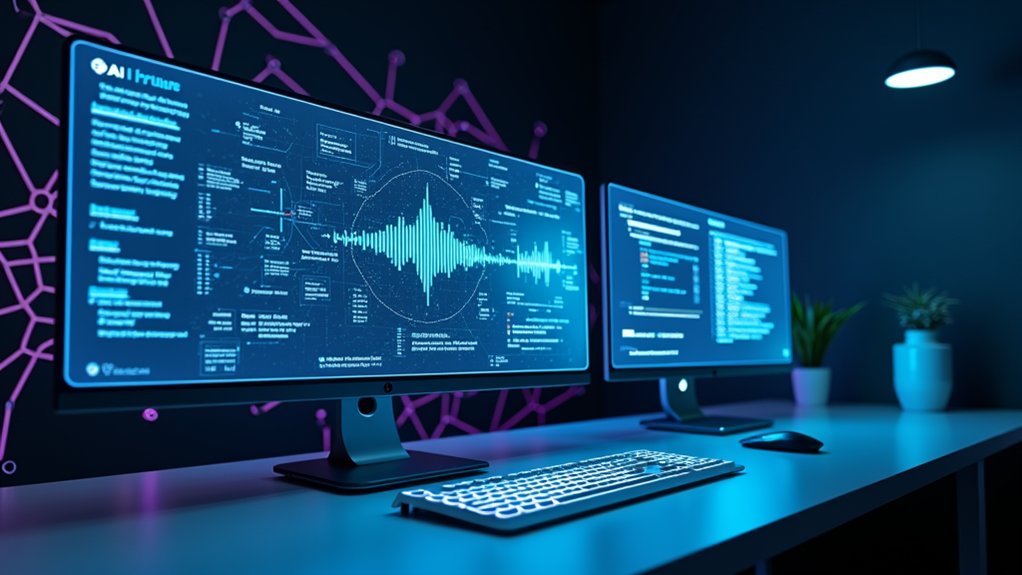What Are the Best Artificial Intelligence Websites?
The best artificial intelligence websites include Perplexity AI, which dominates 2025 rankings through search-engine amalgamation, and ChatGPT-4.5, offering enhanced reasoning capabilities. Google’s Gemini AI excels in multilingual support, while Claude 3.7 ranks highly for advanced reasoning. For content creation, platforms like MidJourney v6 and DALL·E 3 generate sophisticated visuals, while ElevenLabs and Murf AI provide cutting-edge audio solutions. These platforms represent the forefront of AI technology across various specialized applications.

How rapidly artificial intelligence has transformed the digital landscape, creating an extensive ecosystem of specialized platforms designed to enhance productivity across various domains.
The AI assistant market has seen considerable evolution with platforms like ChatGPT-4.5 offering enhanced reasoning and coding capabilities, while Claude 3.7 has achieved the second position in Exploding Topics’ 2025 rankings due to its advanced reasoning and large-context processing abilities.
Google’s Gemini AI has emerged as a formidable GPT-4 competitor with strengths in multilingual support and real-world data amalgamation, whereas Perplexity AI has secured the top position in the 2025 rankings by emphasizing search-engine amalgamation and citation features.
Business solutions powered by artificial intelligence have become increasingly sophisticated, with platforms like 10Web AI Website Builder automating website creation processes and Krisp AI delivering superior audio quality through noise-cancellation technology.
AI’s business revolution has elevated website creation and noise cancellation to unprecedented levels of sophistication and efficiency.
Productivity tools like Notion AI Q&A and Reclaim AI have streamlined workflow management by generating task summaries and automating scheduling respectively, with many integrating seamlessly with platforms like Zapier to enable workflow automation across multiple applications.
Content creation has been revolutionized through tools like Grammarly AI for writing assistance, Rytr AI for SEO-optimized content generation, and AdCreative AI for producing high-converting advertising copy across multiple platforms.
Visual creation capabilities have advanced considerably with MidJourney v6 generating photorealistic images from text prompts, while DALL·E 3 produces complex visuals that can be coordinated with Microsoft Copilot and ChatGPT.
Canva Magic Studio offers accessible design solutions including background removal and image generation, and specialized platforms like Runway ML focus on video generation with features such as Inpainting.
The audio sector has seen comparable innovation with ElevenLabs reaching 2.9 million monthly users by February 2025, offering text-to-speech and voice cloning across 29 languages.
Alternatives like Murf AI provide multilingual voiceover solutions, while Suno AI targets developers seeking low-code voice implementations, and Resemble AI specializes in voice cloning for custom avatars and multilingual applications.
What’s particularly notable is that users can test most of these advanced AI tools without financial commitment, as virtually all platforms provide free versions or trials without requiring credit card information.
Language learning has transformed with AI-powered applications like Duolingo offering gamified approaches to vocabulary acquisition, while Babbel delivers more structured lessons for those seeking comprehensive language mastery.
Frequently Asked Questions
How Much Coding Knowledge Is Needed to Use AI Websites?
AI website usage requirements vary across multiple complexity tiers.
No-code options like Canva Magic Studio and ChatGPT require zero technical knowledge.
Beginner-friendly tools like 10Web AI Website Builder need minimal HTML/CSS familiarity.
Intermediate platforms including Bubble AI and ElevenLabs demand API understanding, while advanced tools such as Cursor AI and v0.dev necessitate substantial programming expertise for effective implementation and customization.
Are AI Websites Accessible on Mobile Devices?
Most AI websites offer mobile accessibility through responsive web design, allowing functionality across smartphones and tablets.
Web-based tools like ChatGPT and Grammarly provide browser-based access, while others offer dedicated mobile applications that enhance performance on iOS and Android devices.
These platforms typically implement touch-friendly controls and simplified interfaces to accommodate smaller screens.
Cloud-based processing enables consistent experiences across devices, though complex functionality may be somewhat limited compared to desktop versions.
What Are the Costs Associated With Premium AI Platforms?
Premium AI platforms involve substantial costs across multiple categories.
Enterprise solutions from companies like Dataiku and H2O.AI range from $5,000 to $50,000+ monthly, while cloud provider services (AWS, Azure, Google Cloud) can cost $1,000 to $100,000+ monthly depending on compute requirements.
Additional expenses include data acquisition and preparation ($10,000 for pilots, $1 million+ for large implementations), plus variable costs driven by GPU/TPU usage, storage solutions, and data transfer fees.
How Often Are AI Websites Updated With New Capabilities?
AI websites typically update their capabilities on varied schedules determined by several key factors. High-growth platforms like Poe and DeepAI implement frequent versions to meet surging user demand, while established providers like Google Gemini and Microsoft Copilot align updates with fundamental product release cycles.
Niche tools often follow incremental improvement paths based on specialization needs. Competitive pressure and funding rounds frequently accelerate update timelines, with subscription-based services prioritizing regular enhancements to maintain user retention.
Can Ai-Generated Content Be Copyrighted or Used Commercially?
AI-generated content alone cannot receive copyright protection under current U.S. law, which requires human authorship.
However, hybrid works incorporating substantial human creative contribution may qualify for partial protection.
Commercial use remains legally complex, since only human-authored elements receive copyright safeguards.
Companies utilizing AI-generated materials commercially must demonstrate sufficient human creative input, while remaining cognizant of potential infringement issues related to training data and evolving international standards in this rapidly developing area of intellectual property law.